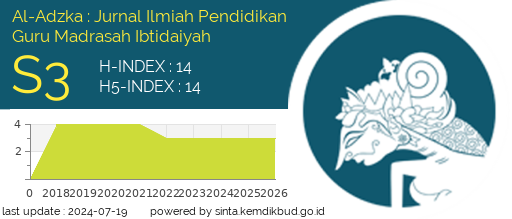PENGGUNAAN STRATEGI ROLE PLAY DAN STRATEGI MODELING THE WAY DALAM PEMBELAJARAN AQIDAH AKHLAK TERHADAP HASIL BELAJAR SISWA KELAS IV DI MIN BAWAN BARABAI
DOI:
https://doi.org/10.18592/aladzkapgmi.v7i1.2028Keywords:
Role play Strategy, Modeling The Way Strategy, Learning Outcomes, Aqeedah AkhlakAbstract
This research aims to determine the learning outcomes of Aqeedah Akhlak for students who learn by implementing role play learning strategies for experimental class and modeling the way strategy for the control class and to know the difference between the use of role play strategy and modeling the way strategy for learning outcomes of Aqeedah Akhlak for students IV grade at MIN Bawan Barabai. This research used experimental method. The subject of the research is the fourth grade students at MIN Bawan Barabai academic year 2016/2017. IVA grade is as experimental group (using role play strategy) and IVB grade is as control group (using modeling the way strategy) .The material taught is morality story of Masyitah. The student's initial ability data is taken from the pretest and posttest values as the research data. The learning outcomes of Aqeedah Akhlak for IV grade students in MIN Bawan Barabai by using role play strategy (pretest 66 and average value of posttest 84.66). While learning result of Aqeedah Akhlak fourth grade student in MIN Bawan Barabai by using strategy of modeling the way (pretest average value 62 and posttest average value 80,66). Based on the test result with U test, it can be concluded that there is no significant difference between the use of role play strategy in experimental group and the use of modeling the way strategy in control group on learning outcomes of Aqeedah Akhlak for fourth grade students MIN Bawan Barabai.References
Agus, Mikha, Widiyanto, Statistik Terapan, Jakarta: PT Gramedia,2003.
Ahmadi, Khoiru et al, Strategi pembelajaran Sekolah Terpadu, Jakarta, PT: Prestasi Pustakaraya, 2011.
Akib ,Zainal, Membangun Profesionalismem Guru dan Pengawas Sekolah,Bandung: C Yama Widya,2007.
Ali, Muhammad Guru Dalam Proses Belajar Mengajar, Bandung: Sinar Baru Algesindo, 2007.
Ash-Shiddieqy, tengku m HAsbi, Tafsir Al quranul Majid An-Nuur 1 Semarang, PT Pustaka Rizki Putra,2000.
Arikunto, Suharsimi, Prosedur Penelitian Suatu pendekatan Praktik, Jakarta: Rineka Cipta, 2010.
, Dasar-Dasar Evaluasi Pendidikan, Jakarta: PT Bumi Aksara, 2005.
Azwar , Saifuddin, Metode Penelitian, Yogyakarta: Pustaka Belajar,2000.
Bahri, Syaiful Djamarah dan Aswan Zain, Strategi Belajar mengajar, Jakarta: PT. Rineka Cipta, 2006.
, dan Azwan Zain Prestasi Belajar dan Kompetensi Guru, Jakarta, Usaha Nasional, 1994.
Bugin, Burhan, Metode Penelitian Kuantitatif, Jakarta: Raja Grafindo Persada, 2007.
Chalijah has anal, Dimensi-dimensi Psikologi Pendidikan, Surabay: Al-Okhlas, 1994
Dalyono M, Psikologi Belajar, Jakarta: Rineka Cipta, 2001.
Dardjojo , Soedjono, Perkembangan Lingistik di Indonesia, Jakarta: Arem, 1985.
Darajat ,Zakiyah, Metode Khusus Pengajaran Agama Islam,Jakarta: Bumi Aksara ,2004.
Departemen Pendidikan dan kebudayaan,kamus Besar Bahasa Indobesia, Jakarta: balai Pustaka,2001
Hariwijaya, M dan Triton PB, Pedoman Penulisan Ilmiah Skripsi dan Tesis, Yogyakarta: Oryza, 2011
Ilyas, Yunahar, Kuliah Aqidah Islam Yogyakarta: Lembaga Pengkajian dan Pengalaman Islam, 2000
Maskawiah, Ibnu. Madzahib Akhlaqiyya. Bairut: Dar Al-Qutub Al-Ilmiyah.1993.
M, A. saefuddin, et. Al, Desekularisasi Pemikiran: Landasan Islamisasi, Bandung: Mizan, 1993.
Mawardi,¬ IAD,ISD,IBD, Bandung: Pustaka Setia, 2000.
Nasharuddin, Akhlak ciri manusia paripurna, Jakarta: PT RajaGrafindo Persada, 2015
Undang-undang No 20 Tahun 2003 Tentang Sistem pendidikan nasional dan Penjelasnnya. Yogyakarta, Media Wacana Press, 2003.
Usman dan Setiawati, Upaya Optimaslisasi kegiatan Belajar Mengajar, Bandung: PT. REmaja Resda Karya Ofset, 2001.
Riduan, Belajar Mudah Penelitian Untuk Guru-aryawan dan Penelitian Pemula, Bandung: Alfabeta, 2005.
Roestiyah, Strategi Belajar dan Mnengajar, Jakarta: PT Rineka Cipta, 2008.
Sanjaya, Wina, Strategi Pembelajaran Berorientasi Standar Proses Pendidkan, Jakarta: Kencana, 2006.
Sabri, Ahmad, Strategi Belajar Mengajar dan Micro teaching, Jakarrta: kuantum Taeching, 2005
Sadijono, Anas, Penganntar Evaluasi Pendidikan Jakarta: Raha Grafindo Persada, 2005
Sholeh Moh Hamid, Metode Edu Tainment, Yogyakarta: Diva Pres, 2011
Slameto, Belajar dan Faktor-faktor yang Mempengaruhinya, Jakarta: Rineka Cipta, 2003.
Subroto, Suryo, Proses belajar mengajar di Sekolah, Jakarta, Rineka Cipta, 1997 Surabaya, Pustaka Progressif, 1997
Sugiyono, Metode Penelitian Pendidikan pendekatan Kualititaif dan Kuantitatif dan R & D. Bandung: Alfabeta , 2010
, Statistika untuk Penelitian, Bandung: Alfabeta, 2013
, Metode Penelitian Kuantitatif Kualitatif dan R dn D, Bandung: Alvabeta, CV.,2014
Sudjana, Nana, Metode Statistik, Bandung: Tarsito, 2005.
Downloads
Published
How to Cite
Issue
Section
License
Copyright (c) 2018 Rusdiana Husaini, muzdhalifah muzdhalifah

This work is licensed under a Creative Commons Attribution 4.0 International License.
Authors who publish with this journal agree to the following terms:
- Authors retain copyright and grant the journal right of first publication with the work simultaneously licensed under a Creative Commons Attribution 4.0 International that allows others to share the work with an acknowledgement of the work's authorship and initial publication in this journal.
- Authors are able to enter into separate, additional contractual arrangements for the non-exclusive distribution of the journal's published version of the work (e.g., post it to an institutional repository or publish it in a book), with an acknowledgement of its initial publication in this journal.
- Authors are permitted and encouraged to post their work online (e.g., in institutional repositories or on their website) prior to and during the submission process, as it can lead to productive exchanges, as well as earlier and greater citation of published work.








